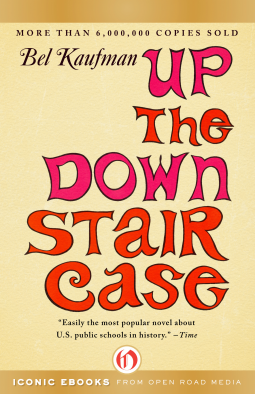Up the Down Staircase by Bel Kaufman
Open Road Media
General Fiction (Adult)
 It boggles the mind: 6,000,000 copies sold. A novel--if it can be called that--about a teacher and her students.
It boggles the mind: 6,000,000 copies sold. A novel--if it can be called that--about a teacher and her students.Kaufman had her finger on the pulse of the American zeitgeist of the time. She wrote for Esquire--the first female to do so. Her grandfather was the writer Sholem Aleichem, and her mother also wrote. So writing as a livelihood was accepted in the family.
The format of the novel is related in letters, memos, student essays. No narrative thread carries the readers through this wash of memoranda. Imagine wading through a bunch of teacher memes on Facebook, which this novel is in essence.
It is true that Americans were ready for a change in narrative format. Metafiction hit the literary world in the 1960s, and the New Wave hit SF. An anthology on Points of View, edited by James Moffett, had been out, detailing all the different ways narrative has been presented.
Historically, school integration was in full swing, and people were still uncertain about it as this novel attests.
Maybe this is what drew people to the novel. It seems most appropriate for new teachers, especially English teachers, getting ready to step into the classroom. It still has a great deal of relevancy, too, despite being fifty years old.
The novel treats Sylvia Barrett, a first-year teacher, thrown into the inner-city New York classroom with over two hundred students to teach, with classes of over forty students per class. She has an older mentor who reassures her along the way. She has a love interest in a young teacher who composes Rodgers-and-Hammerstein style lyrics for every educational event. Her students are mostly in love with her, except for a few, one who hates women teachers. Her bosses have a dictatorial style that Barrett doesn't believe is helpful.
Barrett takes a keen interest in her students. A few of them have dramatic events that draw the reader back in after feeling the monotonous onslaught of essays and memos. One student dies due to an unprofessional abortion, another attempts death when the man she falls in love with (a teacher) doesn't reciprocate her feelings.
Finally, Barrett decides to teach at a private school where she can have her own seminar over Chaucer, but things get hectic at her old school. Her request to leave gets lost. And her foot gets smashed in a cafeteria melee. Her students rally around and she returns.
That is the plot. Yes, full of spoilers, but if I hadn't spoiled it, some might put the book down in boredom. An arc does exist. The characters are vividly and charmingly portrayed in all their ungrammatical and misspelled splendor even if the characters are not dynamic.
It has much to teach us about the 1960s, the worries and concerns, which are not wholly alien to today's human yearnings. Even more potent are the trials of the teacher: trying to juggle student concerns with adminstrators' concerns and those of the parents. Even the parents are the same, begging for their kids to pass even if they don't deserve it. If there is a significant difference between Kaufman's era and our own, this must be it. While similar, the helicopter parenting has spiraled upward.
What is amazing about the novel is that all of the future changes (or pushes for change) in education can be found in here. Sometimes it's as a joke, sometimes not. But even what was an educational joke in the 1960s is taken seriously today. It's almost as if the novel is prescient.
This may not be a novel for the casual reader. That is, while I love the format, it doesn't develop characters enough through it. If your fascination runs to education or the 1960s, your interest will not flag. New teachers might steel themselves for the teaching life with this novel, though.
There is also a movie version, starring Sandy Dennis.

No comments:
Post a Comment